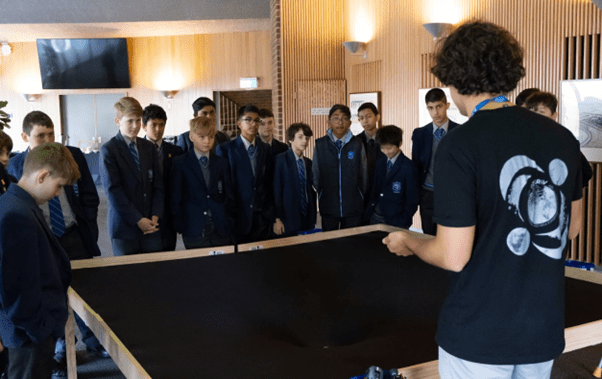For all the variation in science teaching worldwide, classical Newtonian physics is almost always taught before 20th-century discoveries. For a decade, however, some schools in Western Australia have been trying a radically different approach. This idea, known as “Einstein-First”, has been so successful it’s now being taken nationwide, accompanied by a newer program called Quantum Girls. Some teachers in other countries are so excited by the idea they’ve been signing up for online lessons on how to run programs in their own schools.
The idea of teaching science in something like the order it was discovered is so engrained any deviation can initially seem irresponsible. How can one teach the work of 20th-century physicists to children who haven’t learned the 17th- to 19th-century foundations it was built on?
Yet we know science education isn’t working very well. In Australia, as in many other countries, the number of students choosing science and mathematics subjects in upper high school and university courses is falling. Not only does this leave too few STEM graduates to fill many of the jobs that are likely to become available, but it leaves a society dangerously lacking in the basic concepts needed to understand important issues. Climate change deniers and other pseudo-scientists take advantage.
The new approach is being driven by a team that includes gravitational wave hunters Emeritus Professor David Blair of the University of Western Australia and the Australian National University’s Distinguished Professor Susan Scott. The two shared Australia’s most valuable scientific prize in 2020.
Scott, who has been part of some of the biggest physics discoveries of recent years, told IFLScience that the pilot versions of the project have been rigorously studied. Students have been tested for their knowledge of the subjects and their attitudes to science, particularly physics, before and after taking the courses. All categories of students benefited, but it’s among girls and members of disadvantaged groups that the change has been most dramatic.

Students are seen learning about the way large masses warp space-time through an analogous stretchy material.
Image Credit: Jess Groch/supplied.
One of the questions students are asked is “Do you find science interesting?”. Scott told IFLScience that on a 100-point scale, girls’ responses rise from the 20s beforehand to the 80s. Boys end up similarly positive but start from a higher base. The 28 schools that have piloted the program include expensive private schools and mainstream state schools. While responses have been overwhelmingly encouraging, some of the best results came among Indigenous students in the remote northern regions of Western Australia.
Between year 3 (7-8-year-olds) and year 10 (the last year of compulsory science education in Australia) students learn Special Relativity concepts such as time dilation and ideas from General Relativity like warped space and black holes. Other topics like the nature of photons introduce quantum theory while modern cosmology, climate science, and renewable energy all get a run. Unsurprisingly given those responsible, gravitational waves are very much part of the syllabus. Even when the mathematics needed to back up the concepts is introduced it is done using engaging ways such as hands-on experiments.
Naturally, the classes, particularly at primary school cannot be as in-depth or as mathematical as they would be when taught at university, where students traditionally meet many of these concepts for the first time. However, “Young kids are much more susceptible to soaking these concepts up than adults,” Scott said. Where to an adult the wave-particle duality of a photon may be strange enough to resist, Scott has found children grab it with enthusiasm.
Nor does the teaching stop when classes finish. Despite the name, Quantum Girls is available to all students aged 11-15. However, to break down stereotypes of physics as a field for men the program is training 200 female teachers to run introductions to topics like quantum computing. Voluntary STEM clubs and hackathons that try to address real-world problems in teams using science will be run at lunchtime and after school, and Scott says the signs are plenty of students are eager to attend.
“Our goal is to capture students at that crucial moment when they begin to doubt their affinity for science. We transform their perception from ‘science is not my subject’ to ‘science is my passion’,” Dr Jyoti Kaur, who has helped deliver Einstein-First and is developing Quantum Girls, said in a statement.
Primary education changes take a long time to show their effects. Scott told IFLScience that the first students to take Einstein-First are just starting to come of age to choose university subjects, so the data is not yet available to see whether more are choosing STEM. However, the signs at younger ages are so good the team considered it was time to take the idea to a wider audience. To the best of their knowledge, no similar program exists in another country, but American teachers have started taking joining the online training, despite the time difference.
“We are at a critical time when it comes to developing our future STEM workforce,” Scott said. “The challenges and opportunities are already here, whether it be AI, climate change or the future of computing. But at the moment our school system is failing us in what we need for the future. We can’t afford to let that happen.”
Source Link: “Einstein-First” Teaching Takes School Science Classes Out Of The 19th Century